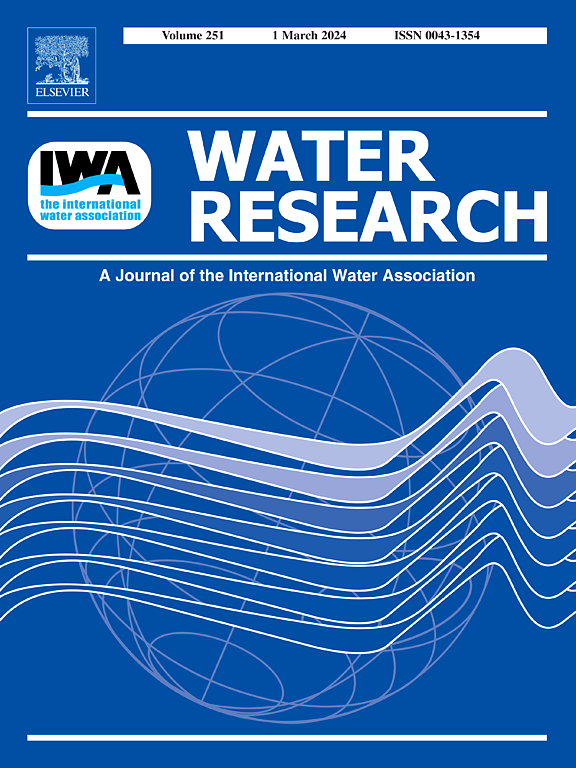Microbial advanced oxidation aroused by bacteria-algae symbiosis induced abiotic methane production in anaerobic digestion
IF 11.4
1区 环境科学与生态学
Q1 ENGINEERING, ENVIRONMENTAL
引用次数: 0
Abstract
The slow decomposition of recalcitrant substrate limits the conversion efficiency of anaerobic digestion. Microbial advanced oxidation, capable of in-situ generating reactive oxygen species (ROS) with the microbial aerobic/anaerobic respiration, provided a potential way to strengthen the substrate-methane conversion in anaerobic digestion. In this study, microalgae were inoculated in anaerobic system and formed redox oscillation under the intermittent illumination, which ultimately increased the methane production by 27.4%. With the redox oscillation, •OH, the typical ROS, showed a 6.27-fold increase in production (72.95 ± 9.06 μM vs. 10.03 ± 1.49 μM), facilitating the decomposition of lignocelluloses. Notably, abiotic methanation was observed in anaerobic digestion with the occurrence of microbial advanced oxidation. ROS quenching experiments revealed that abiotic methanation roughly accounted for 17.5% of the total methane production. Microbial advanced oxidation formed by redox oscillation showed the potential to strengthen anaerobic digestion. Notably, for the first time, it was confirmed that abiotic methanation could be established in anaerobic digestion with the ROS generated by microbial advanced oxidation, which offered a new perspective to understand and improve the performances of natural and engineered ecosystems.

细菌-藻类共生引起的微生物深度氧化诱导厌氧消化产生非生物甲烷
顽固性底物分解缓慢限制了厌氧消化的转化效率。微生物高级氧化技术能够通过微生物的好氧/厌氧呼吸原位生成活性氧(ROS),为加强厌氧消化过程中基质-甲烷转化提供了一种潜在的途径。本研究将微藻接种于厌氧系统中,在间歇光照下形成氧化还原振荡,最终使甲烷产量提高27.4%。在氧化还原振荡下,典型活性氧•OH的产量增加了6.27倍(72.95±9.06 μM vs. 10.03±1.49 μM),有利于木质纤维素的分解。值得注意的是,在厌氧消化中观察到非生物甲烷化与微生物高级氧化的发生。ROS猝灭实验表明,非生物甲烷化约占总甲烷产量的17.5%。氧化还原振荡形成的微生物高级氧化显示出加强厌氧消化的潜力。值得注意的是,首次证实了微生物深度氧化产生的活性氧可以在厌氧消化中建立非生物甲烷化,这为了解和改善自然和工程生态系统的性能提供了新的视角。
本文章由计算机程序翻译,如有差异,请以英文原文为准。
求助全文
约1分钟内获得全文
求助全文
来源期刊

Water Research
环境科学-工程:环境
CiteScore
20.80
自引率
9.40%
发文量
1307
审稿时长
38 days
期刊介绍:
Water Research, along with its open access companion journal Water Research X, serves as a platform for publishing original research papers covering various aspects of the science and technology related to the anthropogenic water cycle, water quality, and its management worldwide. The audience targeted by the journal comprises biologists, chemical engineers, chemists, civil engineers, environmental engineers, limnologists, and microbiologists. The scope of the journal include:
•Treatment processes for water and wastewaters (municipal, agricultural, industrial, and on-site treatment), including resource recovery and residuals management;
•Urban hydrology including sewer systems, stormwater management, and green infrastructure;
•Drinking water treatment and distribution;
•Potable and non-potable water reuse;
•Sanitation, public health, and risk assessment;
•Anaerobic digestion, solid and hazardous waste management, including source characterization and the effects and control of leachates and gaseous emissions;
•Contaminants (chemical, microbial, anthropogenic particles such as nanoparticles or microplastics) and related water quality sensing, monitoring, fate, and assessment;
•Anthropogenic impacts on inland, tidal, coastal and urban waters, focusing on surface and ground waters, and point and non-point sources of pollution;
•Environmental restoration, linked to surface water, groundwater and groundwater remediation;
•Analysis of the interfaces between sediments and water, and between water and atmosphere, focusing specifically on anthropogenic impacts;
•Mathematical modelling, systems analysis, machine learning, and beneficial use of big data related to the anthropogenic water cycle;
•Socio-economic, policy, and regulations studies.
 求助内容:
求助内容: 应助结果提醒方式:
应助结果提醒方式:


